Tompkins Legislators implored to back Gaza Cease-Fire
By Robert Lynch, January 3, 2024
“We can all take a position that we want to see a cease-fire, and I guarantee Bibi Netanyahu is not going to listen to any of us.”
Tompkins County Legislator Deborah Dawson, in session, January 2nd.
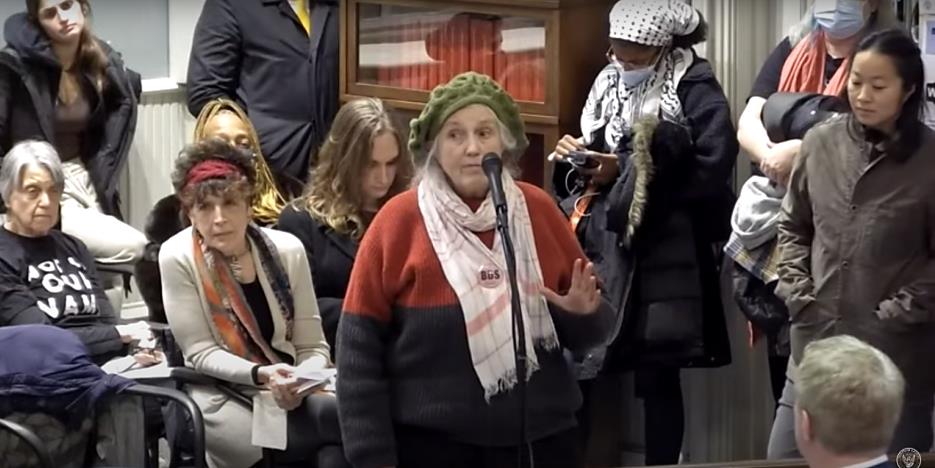
Arguably the case can be made that setting foreign policy is none of local government’s business. But that may not stop the Tompkins County Legislature from weighing-in on the Israel-Hamas war and in crafting a Resolution to urge a cease-fire in the conflict.
Tuesday night, following a largely one-sided, barrage of Palestinian-supportive comments from a roomful of activists—the kinds of statements that would drive the likes of Congresswoman Elise Stefanik nuts—a near majority of legislators, led by Ithaca’s Travis Brooks, agreed to piece together some sort of measure that would likely recommend some sort of cease-fire to halt the Gaza war. Their work-product could see legislative action as soon as January 16th. Just who might read what they’d write and adopt didn’t really seem to matter.
“We don’t need more than eight people to pass a Resolution; we don’t need everybody to agree on every piece of what’s written in that Resolution,” Travis Brooks told legislators after as many as two dozen partisan advocates had spoken from the visitors’ gallery. “There are some things that just seem to be what people want,” Brooks observed, “and that’s a cease fire.”
What drew Palestinian sympathizers to Legislative Chambers and prompted Brooks to reach out was a more than 800-word Resolution—more aptly-termed a position statement—written by the Tompkins County Human Rights Commission and adopted by the Commission December 18th. The Rights Commission’s document calls both for an Israel-Hamas cease-fire and for humanitarian assistance be provided the Gaza Strip’s Palestinian population.
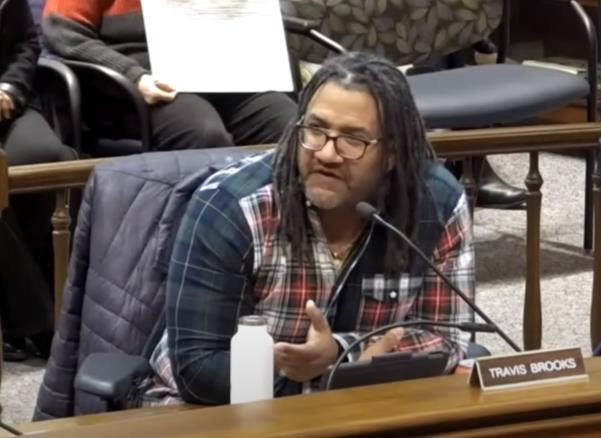
The County Legislature took no action on the cease-fire initiative Tuesday. Instead, Brooks volunteered to pull together willing legislators to meet with the Human Rights Commission members and draft cease-fire supportive language, presumably wording that’s generic enough to secure majority support.
Still, what’s likely to emerge from Brooks’ collaboration will never convey the partisanship and passion as did the arguments raised by most of those who spoke at Tuesday’s meeting. Public remarks collectively consumed nearly 90 minutes of the Legislature’s three-hour meeting. The session proved anything but dull.
“I cannot call Hamas terrorists, I’m sorry, I have to call them freedom fighters,” Sarah Fern of Ithaca spoke to legislators from the gallery. “And I will call the organization in Israel who does promote the most terror, I will call them terrorists,” Fern added, “and that is the IDF (the Israel Defense Forces).”
“Israel is an apartheid state,” asserted speaker Greg Brooks-English. He continued, “The October 7th Hamas attack killing 1,200 Israelis cannot be understood in a vacuum, but must be understood in the context of the 75-year occupation.”
Mona Salzmann spoke in opposition to both Israel’s bombardment of Gaza and its building of settlements in the West Bank. “As a Jew, I say Not in My Name,’ as an American I say, Not in My Name; and as a citizen for 35 years of Tompkins County, I ask you to join me and others here to say Not in Our Name.”
The only elected leader who addressed the meeting that night, Ithaca Alderperson Phoebe Brown, used part of her speaking time to play audio of a purported 14-year old Palestinian boy who was rapping a song that urged liberation of his people.
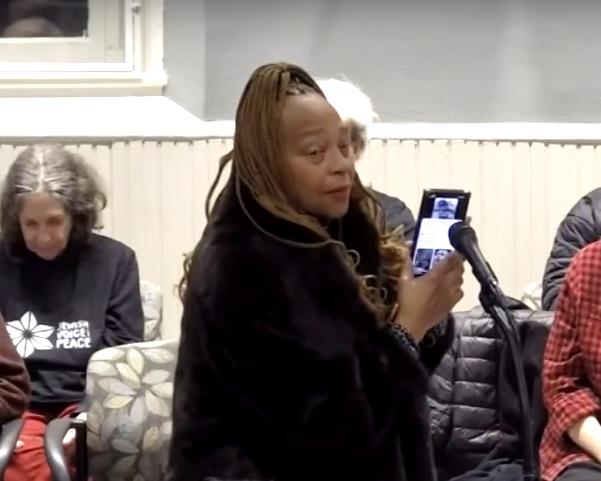
“All I want t see is peace in the Middle East,” Brown professed. Yet she quickly pivoted to a closer, darker—and highly more controversial— assertion. “We have a Gaza Strip right here in Ithaca,” Alderperson Brown maintained. “Don’t ever forget it. We have people dying in our communities.”
One speaker wrapped his face in a scarf and called himself only by the name “John Doe.” And when formally introducing her group’s narratively-drafted Resolution to the Legislature, Human Rights Commission Chair Peyi Soyinka-Airewele comforted lawmakers that should they adopt what her Commission had crafted, they would not stand alone. Similar calls for a Gaza cease-fire have come forth from city councils in places like Detroit, Oakland, Berkeley, and Long Beach, California.
“It is about fundamental human rights; that the tenets and principles of humanity should not be obscured or overridden by the tenets of warfare,” Soyinka-Airewele said of the text her Commission had scripted.
As its key paragraph, the Human Right Commission’s Resolution urges the County Legislature “to join other jurisdictions in calling on our President and Congress members to demand an immediate and sustainable ceasefire; release of all hostages, unrestricted entry of humanitarian assistance into Gaza; the restoration of food, water, electricity, and medical supplies to Gaza; and the respect for international human rights law.”
The Commission further encouraged the County Legislature “to provide strong leadership in proactively countering the various forms of fear, anxiety, intimidation, discrimination, and hate experienced by members of the local Jewish and Muslim communities.”
Enfield legislators Anne Koreman and Randy Brown each voiced varying degrees of support for legislator Brooks’ effort to craft a future Israel-Hamas Resolution. So did colleagues Veronica Pillar, Greg Mezey, Amanda Champion, Susan Currey, and former Chairwoman Shawna Black.
“We need to say something,” Koreman said from her meeting perch on Zoom. “I can’t say exactly what it would be, but I am definitely willing to help with that.”
But before Lansing Republican Mike Sigler signs on to anything Koreman and Brooks might draft, Sigler will demand balance; wording far different from what the Human Rights Commission came up with, and language also far different from he’d heard that night.
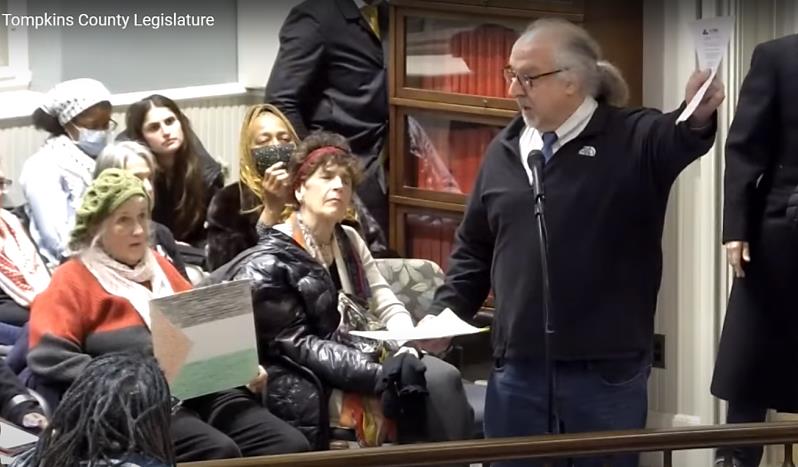
“Perhaps if there was more support for Israel immediately after October 7th, I would feel this is not a one-sided Resolution,” Sigler, now a candidate for the New York State Senate, spoke in critique of the Rights Commission’s rendering. “Because of that lack of empathy,” he said, “the Resolution in my opinion has several fatal flaws,”
The Lansing Republican rattled off his complaints: The Rights Commission’s statement calls for only a cease-fire on Israel’s part. It also fails to acknowledge that what was an effective cease-fire had been in place up through October sixth, a cease-fire that Hamas broke, as Sigler put it, “with the slaughter and rape of more than 1000 Jews, including women and babies.”
“One of the speakers tonight, she looked at Hamas as freedom- fighters,” Sigler lamented. Yet Sigler saw Gaza’s military arm far differently. “This is literally in their charter: Their goal is to kill Jews,”
“I’d like to think that this was just one constituent, or two constituents,” Sigler said of those who’d offered their one-sided, Hamas-sympathetic defenses from the visitors’ gallery and in emails beforehand. “But reading all of the comments that came in, I know this is simply not the case; that this support is lacking for Israel and what it has gone through.”
Democrat Rich John joined Sigler in that elusive search for rhetorical balance.
“I have real skepticism that Hamas has any good faith here, and that a cease-fire might lead to just a couple years, and they’ll be doing it again,” John worried aloud. “I don’t know how anything changes from Hamas’ standpoint,”
“This issue is complex and really nuanced, Lansing’s Deborah Dawson opined. “And to only look at it from the perspective of the last 75 years, is like solving a Rubik’s Cube by looking at one side of the cube.” Dawson reminded Israel’s accusers that enemies have persecuted Jews for 2000 years, and the Holocaust cost millions more lives.
There’s also the problem, Dawson brought up, of infusing one activist’s moral choices into another person’s—a legislator’s—mind, mouth and heart, not to mention branding it onto the county she represents.
“If you’re asking me to take a moral position, it has to be my moral position, not yours,” Dawson lectured.
And broadening her reasoning to the full County Legislature, Dawson continued, “It can be very difficult for us to come up with a moral position, a statement of moral position that we all agree to. And as offended as some of you may be that the United States Government is sending money to kill Palestinians, and we say, Not in My Name, I’m a little concerned about somebody issuing moral statements on behalf of the Tompkins County Legislature that I might not agree with, but that thing’s going to go out in My Name.”
And then, for Dawson, there’s the reality check:
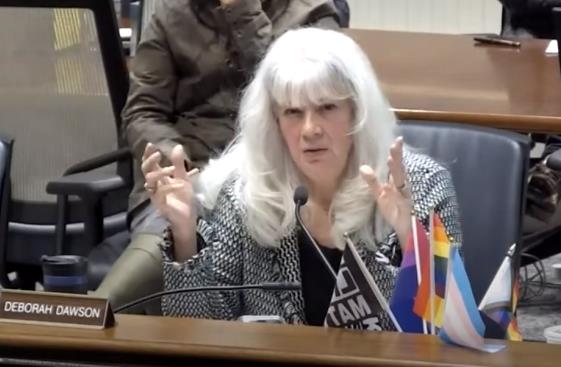
“What’s our end game here?” the legislator asked. “We can all take a position that we want to see a cease-fire, and I guarantee you Bibi Netanyahu is not going to listen to any of us. He doesn’t listen to his own government. He doesn’t listen to the U.N. He doesn’t listen to any mitigating influence that the Biden Administration has tried to express. He’s certainly not going to be swayed by the Tompkins County Legislature. And neither is Hamas.”
“This isn’t what we do,” Rich John observed. “Maybe the Tompkins County Legislature should have a component of foreign policy, and we should be given some authority to do something about it?” he questioned in the hypothetical. “But we don’t…. We can express (only) an opinion, if that means anything.”
Twenty-three public speakers, by this writer’s count, went to the Legislature’s microphones and shared their support for the Human Rights Resolution that night. We’re told about an equal number attended the meeting, but remained in their seats. Yet a twenty-forth speaker, Peter Salton, son of Holocaust survivors, swam against the Politically Correct current of persuasion that night. His words deserve quotation.
“There is no room for an organization , a terrorist organization, that drags the raped, dismembered bodies of females in the backs of jeeps surrounded by green, red, and black flags, waving their dismembered parts in exhilaration,” Salton said of the Hamas fighters who stormed Israel on October seventh. “I feel sorry for the Palestinian citizens that are there,” he continued, “Why don’t they get rid of these people? What are you doing?”
And as for the Human Rights Commission’s handiwork, Salton saw little to like.
“This Resolution, I appreciate the hard work that went into it,” Salton said. “But I don’t see the word ‘terrorist’ anywhere in the four corners of this thing. Where is it? To condemn all this other stuff without condemning terrorism is weak. And it’s a weak Resolution.”
When—or if—the Tompkins County Legislature later this month calls for a cease-fire in the Gaza Strip, lawmakers will, by necessity, speak in Peter Salton’s name, just as they will speak in the names of Sarah Fern, Deborah Dawson, Mike Sigler, and all of the rest of us. And there, Tompkins County, lies the problem inherent in all such morality-based animals of this breed of feel-good Resolution. They unavoidably speak the wishes of some, but not of others. One script does not please all. When the roll is called, our elected legislators should keep in mind that admonition.
###

